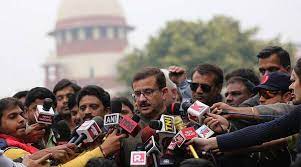
A public interest litigation has been filed in the Supreme Court by Wasim Rizvi seeking declaration of 26 verses of the Quran as unconstitutional, non-effective and non- functional on the ground that these promote extremism and terrorism and pose a serious threat to the sovereignty, unity and integrity of the country.
Daily Current Affairs Quiz 2021
Millions have memorised the Quran; the petitioner has not mentioned how any court can delete these verses from their memory.
Under Indian law, only a “law” can be challenged as unconstitutional. Article 13(3) defines law, which includes any ordinance, order, by-law, rule, regulations, notification, custom or usage having in the territory the force of law.
“Laws in force” on the commencement of the Constitution include laws enacted by a legislature or other competent authority.
This definition certain does not cover any religious scripture including the Quran. Similarly, neither the Vedas nor the Gita, nor the Bible, nor the Guru Granth Sahib can be said to be “law” under Article 13 and thus challenged in a court of law.
The divine books can be sources of law but not law in themselves. Thus, Quran in itself is not “law” for the purposes of Article 13.
It is the paramount source of Islamic law and Muslim jurists extract laws from it through interpretation and also taking into account other sources of law such as Hadees (Prophet’s sayings), Ijma (juristic consensus), Qiyas (analogical deductions), Urf ( customs), Istihsan (juristic preference) and Istisilah (public interest).





